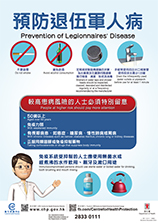Legionnaires' Disease
2019-11-25
Legionnaires' disease (LD) is an infectious disease caused by a type of bacteria called Legionella. The disease was named after an outbreak of chest infection occurring in a Legion Convention in the United States in 1976.
People may get infected when they breathe in contaminated droplets (aerosols) and mist generated by artificial water systems. They may also get the infection when handling garden soils, compost and potting mixes. It mostly presents with fever, cough, shortness of breath, tiredness, headache and muscle pain. The incubation period is about 2 to 10 days. In general, the disease is not transmitted by person-to-person contact, eating or drinking.
For details, please refer to the factsheet of Legionnaires' disease
|
||||||||||||
